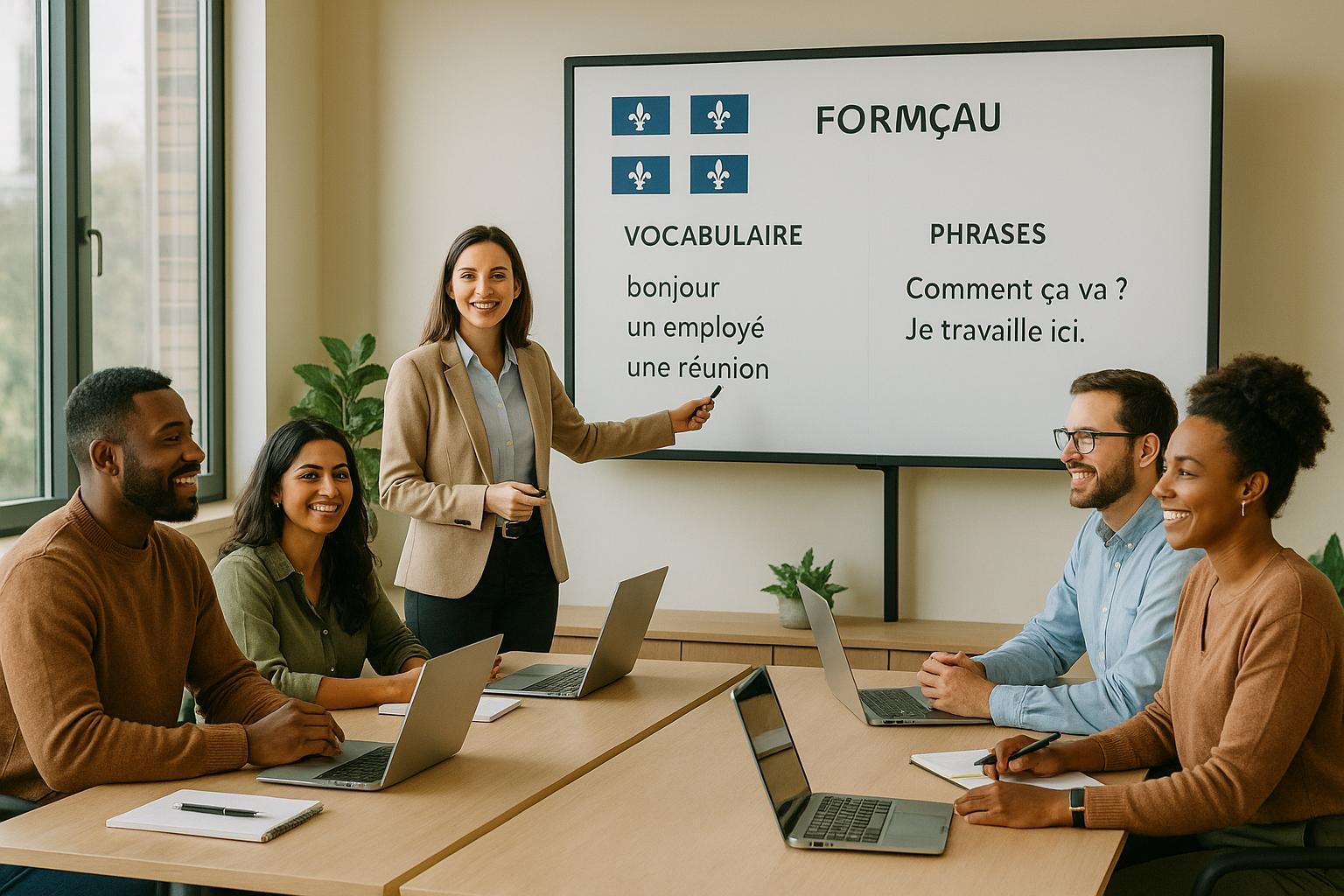New Language Requirements in France explained (2026): TCF IRN
Starting in 2026, France's new language requirements for residency and citizenship will require proficiency in speaking, writing, reading, and listening.

New Language Requirements in France explained (2026): TCF IRN
Starting in 2026, France will introduce updated French language requirements for residency, permanent residence, and citizenship applications. The TCF IRN test will now assess four language skills - listening, reading, speaking, and writing - aligned with CEFR levels. Key changes include:
- Multi-year residence permits: Minimum A2 proficiency.
- Permanent residence: B1 proficiency required.
- Naturalization (citizenship): B2 proficiency required.
The new system emphasizes a comprehensive evaluation of language skills, replacing older standards that often excluded speaking and writing tests. Certificates remain valid for two years, but stricter renewal processes will apply. These changes aim to standardize language expectations and promote better integration for newcomers.
Preparing for the TCF IRN will require focused practice across all test sections. Tools like Francoflex offer personalized learning options, including AI-driven speaking practice, to help individuals and businesses meet these requirements effectively.
🇫🇷 Nouveau TCF IRN 2025 -Test de Connaissances du Français Intégration Résidence Nationalité ✅💯

TCF IRN Structure and Standards
The TCF IRN evaluates key French language skills through a structured four-section format, designed to prepare candidates thoroughly for test day.
Test Sections
The test is divided into four sections, each focusing on essential French language skills used in daily life.
Listening Comprehension is the first section, lasting about 25 minutes. It features audio recordings of everyday conversations, announcements, and interviews. This section measures your ability to understand spoken French in practical, real-life situations.
Reading Comprehension, which takes approximately 45 minutes, includes a variety of written materials such as articles, official documents, advertisements, and personal correspondence. This section assesses your ability to extract important information, understand main ideas, and interpret subtle meanings in written French.
Oral Expression involves a 12-minute face-to-face interaction with an examiner. You'll discuss familiar topics, share opinions, and respond to hypothetical scenarios. For instance, you might describe your hometown, outline your career aspirations, or talk about current events.
Written Expression gives you 60 minutes to complete tasks ranging from filling out forms and writing personal messages to composing formal letters and short essays.
New CEFR Level Requirements
Starting in 2026, the TCF IRN introduces updated minimum proficiency levels aligned with your immigration goals. Each pathway requires specific CEFR levels across all four test sections.
For multi-year residence permits, you must demonstrate A2 level proficiency in all sections. This level indicates you can understand common expressions, engage in simple conversations, and describe basic aspects of your life and surroundings.
Applicants for permanent residence cards need to achieve B1 level proficiency. At this level, you should be able to handle most everyday situations, understand the main points of clear communication on familiar topics, and write simple, connected text on subjects of personal interest.
For naturalization applications, the bar is set higher with a requirement of B2 level proficiency. This level demonstrates the ability to comprehend complex texts, interact fluently with native speakers, and produce detailed written content on a range of topics, including explaining viewpoints on current issues.
Old vs New Standards Comparison
The updated TCF IRN system introduces notable changes to how French proficiency is assessed for immigration purposes.
| Aspect | Previous System | New TCF IRN (2026) |
|---|---|---|
| Test Sections | Listening and reading only for most applications | Four mandatory sections: listening, reading, oral expression, written expression |
| Residence Permit Requirements | A1 level sufficient for initial permits | A2 minimum for multi-year permits |
| Permanent Residence | A2 level accepted | B1 required across all sections |
| Naturalization | B1 level with oral interview | B2 level in standardized test format |
| Certificate Validity | 2 years for most purposes | 2 years maintained, but stricter renewal requirements |
| Scoring Method | Pass/fail for specific thresholds | Detailed CEFR level certification with section-by-section breakdown |
One of the most significant updates is the mandatory inclusion of speaking and writing assessments for all immigration pathways. Previously, many applicants could meet language requirements through listening and reading tests alone, but the new system ensures a more comprehensive evaluation of language skills.
These changes align with France's aim to equip newcomers with practical communication abilities essential for integration. By standardizing the process, the new framework eliminates regional inconsistencies in how language requirements are interpreted, creating a fairer and more uniform system for applicants. This updated approach lays a strong foundation for understanding its legal and practical implications, which will be explored further in the next section.
Legal and Practical Impact for Applicants
The updated TCF IRN requirements bring notable changes for those applying for residency or citizenship in France. These updates impact both current applicants and those planning to apply in the future. Below, we’ll explore eligibility criteria, transitional measures, and the practical challenges these changes introduce.
Who Must Take the TCF IRN?
The TCF IRN is now mandatory for most non-native French speakers applying for residency or citizenship in France. This includes individuals seeking new residence permits, permanent residency, or naturalization. To proceed, applicants must meet specific language proficiency standards.
However, there are exceptions. Those with prior French education or officially recognized qualifications may be exempt. Additionally, alternative assessment options are available for individuals with documented learning difficulties or certain medical conditions.
Transition Period and Certificate Validity
During the transition to the new requirements, certificates issued under the previous system will still be valid for applications already in progress. However, in some cases, updated certification might be requested. Applications submitted during this transitional phase can still follow the older requirements.
Another key change is the certificate renewal process. Once a certificate expires, applicants will need to retake the full test to renew it. For family reunification cases, specific measures have been introduced to ensure that processing delays do not jeopardize an applicant’s legal status. These adjustments aim to align with the comprehensive evaluation standards outlined by the test.
Common Challenges and Considerations
The enhanced requirements come with practical hurdles that applicants must navigate. Here are some common challenges:
- Meeting the new proficiency standards can be time-consuming, especially for individuals juggling work, family, or other responsibilities.
- Costs can add up, including expenses for study materials, tutoring, and potential retakes of the test.
- Test availability is another issue, with longer booking delays reported at major testing centres. This has led some applicants to look for alternative centres with earlier openings.
- Variations in scoring at different test centres, particularly for oral exams, may influence results, making the choice of testing location an important consideration.
- For professionals who depend on maintaining legal status, delays or difficulties in meeting language requirements could have serious consequences.
- The high-pressure nature of the test can increase stress and anxiety, potentially affecting performance and overall well-being.
- Scheduling conflicts may delay the ability to meet the required proficiency standards, complicating the application process and slowing integration efforts.
These challenges highlight the need for careful planning and preparation to meet the updated requirements while navigating the complexities of the application process.
Preparation Strategies and Resources
With the TCF IRN standards tightening in 2026, focused and structured preparation is more important than ever. To succeed, it’s crucial to practise all test areas with a clear strategy in mind.
Step-by-Step Preparation Guide
Start by evaluating your current language proficiency using the CEFR framework. This will help pinpoint your strengths and the areas where you need improvement. Once you have a clear picture, set a realistic study plan that aligns with your goals and timeline.
Devise a weekly study schedule that dedicates time to each test section - listening, reading, writing, and speaking. If listening comprehension is a challenge, allocate extra time to practising with audio materials. However, make sure to maintain consistent practice across all areas to avoid neglecting any section.
Practise under timed conditions regularly and track your scores to spot patterns and weak points. For each test section, apply specific strategies: take concise notes for listening, skim and scan effectively for reading, and use formal French structures in your writing.
Study Materials and Tools
Reliable resources are key to effective preparation. Official TCF materials from France Éducation international, such as preparation manuals, sample tests, and audio exercises, provide an accurate representation of the test’s format and difficulty.
For grammar, resources like the "Grammaire Progressive du Français" series offer structured lessons for all proficiency levels. To enhance listening and reading comprehension, immerse yourself in authentic French media like France 24, Radio France Internationale, or Le Monde. These sources expose you to current events and diverse language usage.
Vocabulary-building tools, such as the "Français Fondamental" lists developed by the French Ministry of Education, help you focus on essential words. Additionally, practice platforms that simulate real test conditions can give you valuable feedback, helping you address knowledge gaps effectively.
To complement traditional methods, modern tools can make your preparation even more efficient.
AI-Driven Learning Platforms
AI-powered platforms are transforming the way people learn languages by offering personalized and adaptive experiences. One such platform, Francoflex, is specifically designed for TCF IRN preparation.
Francoflex tailors its lessons to your current level and vocabulary needs, providing flexibility and personalized learning at any time. A standout feature is the daily AI-driven conversations with a virtual agent, which help improve speaking skills and build confidence in real-life scenarios. The platform also tracks your progress in reading, writing, listening, and speaking, giving you clear insights into your development.
This flexibility is especially valuable for those juggling test preparation with work or family commitments. For Canadian professionals, Francoflex offers workplace-specific content, addressing the unique challenges of learning French in a Canadian context. This tailored approach ensures your preparation is both practical and effective.
Francoflex: French Language Compliance Support

Francoflex takes a modern, AI-driven approach to help users prepare for TCF IRN requirements. With new French language standards set to take effect in 2026, Canadian businesses and individuals need practical tools to meet these regulations. Francoflex combines advanced technology with workplace-focused solutions, making it a valuable resource for anyone navigating France's strict language expectations.
Developed by educator Alexa Love-Tremblay and AI expert Séraphin, this platform caters specifically to Canadian professionals preparing for these French language benchmarks.
Francoflex Key Features
Francoflex offers personalized AI conversations tailored to your language skills, native tongue, and professional needs. It provides daily speaking practice, focusing on the oral exam's 10-minute speaking section - often the most challenging part of the TCF IRN.
For example, a healthcare worker in Montreal requires different French terminology than an engineer in Toronto. Francoflex adapts its lessons to fit these unique demands, ensuring practical and relevant learning.
The platform also supports businesses dealing with Quebec's Bill 96, offering tools to simplify certification processes. Employers can generate custom progress reports that meet OQLF requirements, easing the administrative load.
Francoflex is scalable, accommodating anywhere from a single user to 50,000 employees without additional costs. This makes it a versatile solution for small startups and large corporations alike.
How Francoflex Supports TCF IRN Preparation
The upcoming 2026 requirements mandate A2 level for multi-annual residence permits, B1 for resident cards, and B2 for naturalisation [1][3][4][5]. Francoflex structures its learning paths around these specific CEFR levels, breaking down the TCF IRN's four assessment areas into manageable steps.
Learners receive detailed progress tracking that helps them gauge their readiness for each skill area, ensuring they meet proficiency standards well before their test date. Since TCF IRN results are valid for two years [1][2][3][4], this structured approach allows for strategic and effective preparation.
The AI agent adjusts conversation difficulty based on the learner's target level. For instance, someone working toward A2 certification might practise basic workplace scenarios, while a B2 candidate engages in more advanced discussions about professional topics or current events. This tailored approach builds confidence and ensures readiness for the exam.
Beyond individual preparation, Francoflex also helps businesses meet regulatory obligations, ensuring their workforce is equipped to comply with new language standards.
Benefits for Canadian Businesses
Francoflex offers substantial cost savings. By eliminating the need for instructors, physical classrooms, and printed materials, it can reduce training expenses by up to 35% compared to traditional methods.
The platform is also more engaging - 72% of employees report preferring AI tools over conventional language classes. This higher engagement translates into better completion rates and faster progress toward certification.
Its 24/7 availability makes it ideal for Canada’s diverse workforce. Shift workers can practise during non-standard hours, and remote employees in different time zones enjoy consistent training quality.
Francoflex simplifies compliance reporting by automatically tracking employee progress and generating documentation that satisfies regulatory requirements. This reduces the burden on HR departments and ensures alignment with France's new language standards.
| Francoflex Advantage | Traditional Methods |
|---|---|
| Personalization | Tailored to individual skill levels, native language, and job-specific vocabulary |
| Flexibility | Learn anytime, anywhere |
| Scalability | Supports up to 50,000 employees without extra costs |
| Cost | Cuts training expenses by up to 35% |
| Engagement | 72% of employees find AI tools more engaging |
Additionally, Francoflex enhances employee retention. When companies invest in their staff's professional development through tools like Francoflex, employees often feel more valued. Achieving TCF IRN certification can boost job satisfaction and loyalty, a significant advantage in Canada’s competitive labour market.
Preparing for the TCF IRN in 2026
France’s upcoming changes to language requirements will affect anyone aiming for residency, citizenship, or integration. Getting a head start on understanding these new standards can give you an edge when it comes to planning your preparation. The key? A well-thought-out, personalized strategy to tackle these updates effectively.
To succeed, you’ll need to focus on improving your listening, reading, speaking, and writing skills in a structured way. While there are plenty of learning methods out there, choosing one that aligns with your specific needs can make a huge difference.
AI-powered platforms have emerged as a game-changer for language learning. These tools adapt to your current skill level, target your weak spots, and let you learn at your own pace. This flexibility can be especially helpful as you prepare for the TCF IRN.
For Canadian professionals and businesses, strong French skills are more than just a bonus - they’re essential. Francoflex, for example, offers an AI-driven solution that includes daily AI conversations designed to boost speaking skills. Whether you’re an individual learner or part of a larger organization, this platform supports both personal and corporate training needs.
With the new requirements on the horizon, starting your preparation early is crucial. Familiarizing yourself with the test format and using tailored tools will not only build your confidence but also ensure you’re ready to meet France’s evolving language standards.
FAQs
What do the new TCF IRN language requirements mean for residents applying for permanent residency or citizenship in France?
Starting in January 2026, France will introduce updated TCF IRN language requirements for residency and citizenship applications. Applicants for permanent residency will need to demonstrate A2-level proficiency, while those seeking a 10-year residence card must reach B1-level proficiency. For French citizenship, the bar will be raised to B2, up from the current B1 standard.
These adjustments mean that anyone planning to apply for residency or citizenship will need to improve their French language skills to meet these stricter benchmarks. Starting preparation early - through consistent practice and using focused study tools - can make a significant difference in achieving the required proficiency levels.
What challenges do people face when preparing for the TCF IRN, and how can they overcome them?
Preparing for the TCF IRN can feel overwhelming, especially when you’re trying to get comfortable with the test format, manage your time wisely, and strengthen your French language skills. Many test-takers find it tough to navigate the structure of the exam, stay composed under time constraints, and reach the fluency needed for comprehension, speaking, and writing.
To tackle these hurdles, make consistent practice your priority. Use official sample tests and study guides to get familiar with the exam layout. Build a study plan that works for you, and try immersing yourself in French as much as possible - listen to podcasts, watch movies, or engage in conversations. This regular exposure will naturally boost your confidence and fluency. On top of that, practising time management and carefully reviewing instructions can help you avoid common errors. With a focused approach, you’ll feel prepared and confident when test day arrives.
Are there exemptions or alternatives for individuals who face challenges meeting the TCF IRN language requirements due to medical or learning difficulties?
Individuals facing disabilities or severe medical conditions that make completing the TCF IRN impossible may be eligible for partial or full exemptions. To qualify, applicants must provide valid medical documentation. Local French authorities will review these cases and may offer alternative assessments or accommodations based on the individual's needs.
For those aged 65 or older applying for residency, the language test is generally not required. To confirm eligibility or explore specific options, it’s best to consult with local authorities directly.






